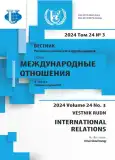Projecting ‘Hybrid Warfare’: Western Discursive Representation of Chinese Foreign Policy
- Authors: Simons G.1, Manoilo A.V.2, Goncharenko A.R.3
-
Affiliations:
- Daffodil International University
- MGIMO University
- Lomonosov Moscow State University
- Issue: Vol 24, No 3 (2024): China’s Global Strategy
- Pages: 345-357
- Section: THEMATIC DOSSIER
- URL: https://journal-vniispk.ru/2313-0660/article/view/320684
- DOI: https://doi.org/10.22363/2313-0660-2024-24-3-345-357
- EDN: https://elibrary.ru/ZHLZJZ
- ID: 320684
Cite item
Abstract
China is the single largest state-based international actor that is a major threat to the continued hegemony of the United States’ unipolar order. As such, a campaign of obstructive foreign policy is being waged against China through the obstructive marketing of China as a sinister threat and unreliable actor against the ‘rules-based order.’ By attempting to undermine China’s soft power potential, it is hoped that China’s global rise can be constrained and contained. Drawing on an integrative type of literature review, this article examines attempts at ‘knowledge production’ through geopolitically subjective interpretations and representations by the U.S. and its allies of the modern type of geopolitically-influenced international conflicts - hybrid warfare. In the English language imagination, hybrid warfare is a politically charged and loaded term that assumes ill intent by the user upon the intended victim. According to the research estimates by foreign experts, the current foreign policy of international activities by China displays a hybrid character. The country is publicly accused of carrying out operations in the economic, cybernetic, geographical, geopolitical, psychological, information and ideological spaces. Currently, the notion of “Chinese hybrid warfare” is starting to become an increasingly popular mass communicated trope. However, the aggravation of Sino-American relations against the backdrop of the South China Sea, the Taiwan issue and the Russian special military operation gives us an opportunity to predict that China will increasingly be projected as an increasingly dangerous source of hybrid threat in the Western-centric discourse to contain its global rise and by default to try to preserve US global hegemony through a negative information campaign.
About the authors
Greg Simons
Daffodil International University
Author for correspondence.
Email: gregmons@yahoo.com
ORCID iD: 0000-0002-6111-5325
SPIN-code: 2833-6515
Adjunct Researcher, Department of Journalism, Media and Communication
Dhaka, BangladeshAndrei V. Manoilo
MGIMO University
Email: cyberhurricane@yandex.ru
ORCID iD: 0000-0002-8142-9110
SPIN-code: 9867-9958
Dr. of Sc. (Political Science), Professor, Department of International Relations and Foreign Policy
Moscow, Russian FederationAnna R. Goncharenko
Lomonosov Moscow State University
Email: annagoncharenko3@yandex.ru
ORCID iD: 0009-0000-5310-0505
SPIN-code: 4244-3486
Postgraduate Student, Faculty of Political Science
Moscow, Russian FederationReferences
- Caliskan, M. (2019). Hybrid warfare through the lens of strategic theory. Defence & Security Analysis, 35(1), 40-58. https://doi.org/10.1080/14751798.2019.1565364
- Chakravorty, P. K. (2019). Hybrid warfare in the Sino-Indian context. CLAWS Journal, 12(2), 80-95. Retrieved from https://www.claws.in/static/PK-Chakravorty.pdf
- Conz, E., & Magnami, G. (2020). A dynamic perspective on the resilience of firms: A systematic literature review and a framework for future research. European Management Journal, 38(3), 400-412. https://doi.org/10.1016/j.emj.2019.12.004
- Cooper, Z., & Shearer, A. (2017). Thinking clearly about China’s layered Indo-Pacific strategy. Bulletin of the Atomic Scientists, 73(5), 305-311. https://doi.org/10.1080/00963402.2017.1364005
- Doshi, R. (2021). The long game: China’s grand strategy to displace American order. New York: Oxford University Press. https://doi.org/10.1093/oso/9780197527917.001.0001
- Flint, C. (2016). Introduction to geopolitics. New York: Routledge. https://doi.org/10.4324/9781315640044
- Fridman, O. (2017). Hybrid warfare or gibridnaya voyna? Similar, but different. The RUSI Journal, 162(1), 42-49. https://doi.org/10.1080/03071847.2016.1253370
- Heath, T. R. (2016). An overview of China’s national military strategy. In J. McReynolds (Ed.), China’s evolving military strategy (pp. 1-39). Washington, DC: The Jamestown Foundation.
- Hoffman, F. G. (2009). Hybrid warfare and challenges. Joint Force Quarterly, (52), 34-48.
- Jash, A. (2019). Fight and win without waging a war: How China fights hybrid warfare. CLAWS Journal, 12(2), 96-109. Retrieved from https://www.claws.in/static/Amrita-Jash.pdf
- Johnson, R. (2018). Hybrid war and its countermeasures: A critique of the literature. Small Wars and Insurgencies, 29(1), 141-163. https://doi.org/10.1080/09592318.2018.1404770
- Kania, E. B. (2019). Minds at war: China’s pursuit of military advantage through cognitive science and biotechnology. Prism, 8(3), 82-101. Retrieved from https://ndupress.ndu.edu/Portals/68/Documents/prism/prism_8-3/prism_8-3_Kania_82-101.pdf
- Lanoszka, A. (2016). Russian hybrid warfare and extended deterrence in Eastern Europe. International Affairs, 92(1), 175-195. https://doi.org/10.1111/1468-2346.12509
- Qiao, Liang, & Wang, Xiangsui. (1999). Unrestricted warfare. Beijing: PLA Literature and Arts Publishing House.
- Nandan, D., & Chauhan, B. (2021). Chinese hybrid warfare strategy: A threat to India’s national security. The Journal of Indian Art History Congress, 27(1), 129-137. Retrieved from https://www.researchgate.net/publication/351660031_CHINESE_HYBRID_WARFARE_STRATEGY_A_THREAT_TO_INDIA'S_NATIONAL_SECURITY
- Pati, D., & Lorusso, L. N. (2018). How to write a systematic review of the literature. HERD: Health Environments Research & Design Journal, 11(1), 15-30. https://doi.org/10.1177/1937586717747384
- Qureshi, W. A. (2020). The rise of hybrid warfare. Notre Dame Journal of International Comparative Law, 10(2), 173-208. Retrieved from https://scholarship.law.nd.edu/cgi/viewcontent.cgi?article=1124&context=ndjicl
- Silverman, D. (2020). Interpreting qualitative data. London; Thousand Oaks, CA: SAGE Publications Ltd.
- Simons, G. (2014). The International Crisis Group and the manufacturing and communicating of crises. Third World Quarterly, 35(4), 581-597. https://doi.org/10.1080/01436597.2014.924062
- Simons, G. (2022). “Inevitable” and “imminent” invasions: The logic behind Western media war stories. Journal of International Analytics, 13(2), 43-58. https://doi.org/10.46272/2587-8476-2022-13-2-43-58; EDN: DWJBFK
- Snyder, H. (2019). Literature review as a research methodology: An overview and guidelines. Journal of Business Research, 104, 333-339. https://doi.org/10.1016/j.jbusres.2019.07.039
Supplementary files









